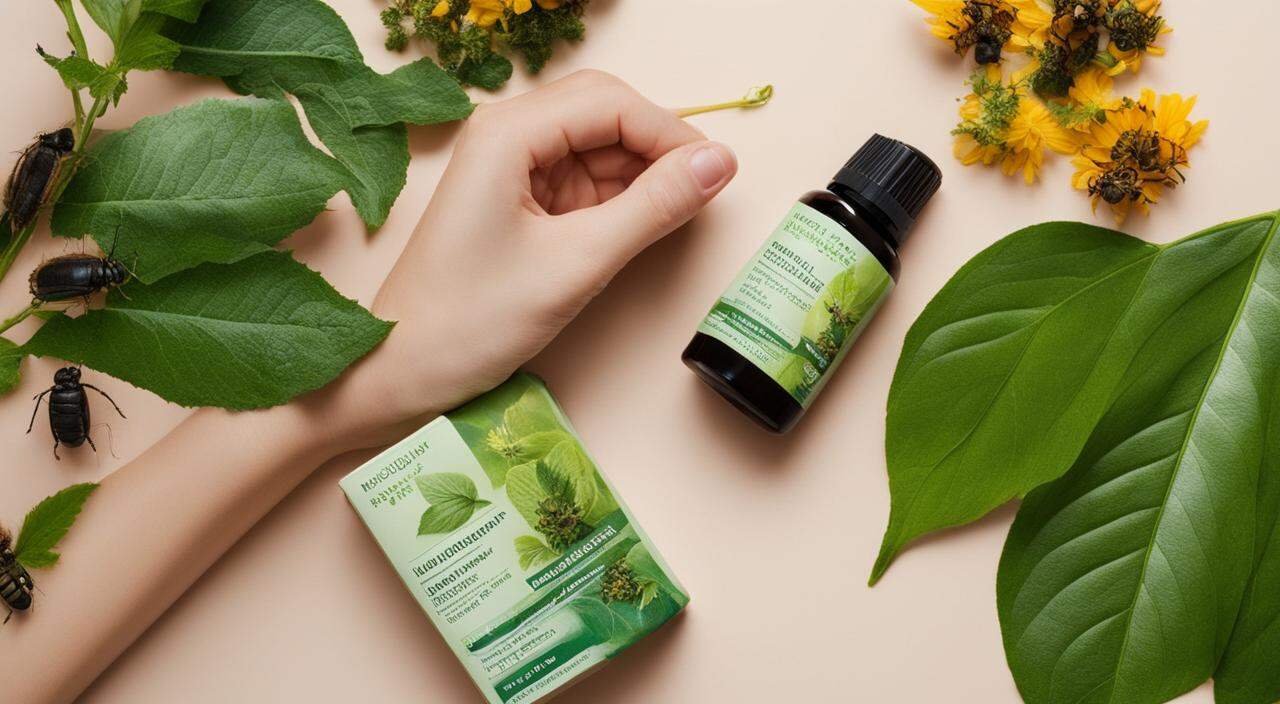When it comes to protecting ourselves from pesky bugs, many of us are concerned about using chemical-laden insect repellents that can be harmful to our skin and the environment. That’s where natural insect repellent for skin come in. These eco-friendly alternatives are made with organic ingredients and offer effective protection against mosquitoes and ticks without compromising our health or the planet.
Organic insect repellents are a safe and non-toxic alternative to traditional bug sprays. They harness the power of natural ingredients, such as essential oils, to ward off insects without the use of harsh chemicals. By choosing natural insect repellents, we can enjoy bug-free outdoor activities without worrying about the potential risks associated with synthetic products.
In this article, we will explore the benefits of using natural insect repellents, delve into popular ingredients used in these products, and provide you with useful tips for using them safely. Whether you’re looking for a homemade bug spray recipe or want to learn more about eco-friendly bug repellents, we’ve got you covered.
Key Takeaways:
- Natural insect repellents for skin are a safe and eco-friendly alternative to traditional bug sprays.
- They are made with organic ingredients and do not contain harsh chemicals.
- Benefits of using natural insect repellents include the use of essential oils and their effectiveness against insects.
- Popular natural ingredients for repelling bugs include citronella, garlic oil, thyme essential oil, and more.
- When using natural insect repellents, it’s important to follow safety tips and do a patch test before applying to the skin.
Benefits of Using Natural Insect Repellents for Skin
Natural insect repellents for skin offer several benefits. They are often made with essential oils as insect repellents, which have natural insect-repellent properties. Homemade insect repellents can be easily made using simple ingredients, making them homemade insect repellents. Plant-based insect repellents are gentle on the skin and do not cause any irritation or allergic reactions, making them plant-based insect repellents.
Essential oils have long been used as insect repellents due to their natural properties. These oils, such as citronella, eucalyptus, and lavender, are known for their ability to ward off insects, making them an effective and natural insect repellent option. Unlike chemical-based repellents, which can be harsh on the skin and may cause irritation, natural insect repellents are gentle and safe for regular use.
One of the advantages of using homemade insect repellents is that you have full control over the ingredients. You can choose the essential oils that work best for you and combine them with other natural ingredients, such as witch hazel or apple cider vinegar, to create customized repellents. Plus, making your own bug spray can be a fun and cost-effective DIY project!
Plant-based insect repellents are formulated using ingredients derived from plants, such as botanical extracts and essential oils. These natural ingredients not only repel insects but also have nourishing and soothing properties for the skin. They are free from harsh chemicals like DEET and provide a safer alternative for those with sensitive skin or allergies.
The Benefits of Using Natural Insect Repellents for Skin:
- Contains essential oils with natural insect-repellent properties.
- Homemade insect repellents can be easily made using simple ingredients.
- Plant-based insect repellents are gentle on the skin and do not cause irritation or allergic reactions.
Comparison of Natural and Chemical Insect Repellents
| Criteria | Natural Insect Repellents | Chemical Insect Repellents |
|---|---|---|
| Safety | Gentle on the skin, no harsh chemicals | Potential irritations and health risks |
| Effectiveness | Repels insects effectively | Repels insects effectively |
| Environmental Impact | Eco-friendly, biodegradable | May contain harmful chemicals, harmful to ecosystems |
| Skin Benefits | Nourishing and soothing properties | No additional skin benefits |
As you can see, natural insect repellents have numerous benefits over chemical-based alternatives. They are safe for the skin, effective at repelling insects, environmentally friendly, and provide additional skin benefits. By choosing natural options like essential oils or making your own homemade repellents, you can protect yourself from bugs without compromising your well-being or the environment.
Popular Natural Ingredients for Repelling Bugs
When it comes to protecting yourself from pesky bugs, natural ingredients can be an effective and eco-friendly solution. These ingredients are commonly used in bug repellents and provide safe alternatives to chemical-laden options. Let’s explore some popular natural ingredients known for their bug-repelling properties:
1. Citrus Oils
Citrus oils, such as citronella and limonene, are highly effective in repelling mosquitoes and other insects. Their refreshing citrus scent acts as a deterrent, keeping bugs at bay. Citrus oils are commonly used in eco-friendly bug repellents due to their natural repellent properties.
2. Garlic Oil
Garlic oil is another natural ingredient that effectively repels ticks. The pungent smell of garlic acts as a powerful deterrent, keeping ticks away from your skin. By incorporating garlic oil into your bug repellent recipe, you can protect yourself from these tiny pests.
3. Thyme Essential Oil
Thyme essential oil is a popular choice for repelling mosquitoes. Its strong aroma masks the scent of human skin, making it difficult for mosquitoes to locate their next meal. Incorporating thyme essential oil into your bug repellent can provide long-lasting protection during outdoor activities.
4. Oil of Lemon Eucalyptus
Oil of lemon eucalyptus is a proven natural mosquito repellent. Derived from the leaves of the lemon eucalyptus tree, this oil repels mosquitoes without the use of harsh chemicals. It is an excellent choice for those seeking safe and effective bug protection.
5. Dill Essential Oil
Dill essential oil is known for its ability to repel cockroaches. Its strong aroma acts as a natural deterrent, keeping these unwanted pests away from your home. By incorporating dill essential oil into your bug repellent recipe, you can create a non-toxic and eco-friendly solution.
6. Cinnamon Oil
Cinnamon oil is not only a popular spice but also an effective mosquito repellent. Its strong scent acts as a natural deterrent, preventing mosquitoes from landing on your skin. Incorporating cinnamon oil into your bug repellent can provide a pleasing aroma while protecting you from bug bites.
7. Lavender Essential Oil
Lavender essential oil is well-known for its soothing properties and pleasant fragrance. However, it is also effective at repelling mosquitoes. Adding lavender essential oil to your bug repellent recipe not only wards off bugs but also leaves a calming scent on your skin.
| Natural Ingredient | Benefits |
|---|---|
| Citrus Oils | Repels mosquitoes and other insects |
| Garlic Oil | Deters ticks |
| Thyme Essential Oil | Repels mosquitoes |
| Oil of Lemon Eucalyptus | Proven mosquito repellent |
| Dill Essential Oil | Repels cockroaches |
| Cinnamon Oil | Effective against mosquitoes |
| Lavender Essential Oil | Repels mosquitoes, soothing properties |
These natural ingredients offer a safe and effective way to repel bugs without compromising your health or the environment. By incorporating them into your bug repellent recipes, you can enjoy the outdoors without the annoyance of bug bites.
Safety Tips for Using Natural Insect Repellents
While using natural insect repellents is generally safe, it’s important to follow some safety precautions to avoid any potential issues. Here are some safety tips to keep in mind when using these chemical-free insect repellents:
- Dilute essential oils: Some essential oils can cause skin reactions if applied directly. To prevent any irritation, always dilute essential oils with a carrier oil like coconut oil or almond oil before applying them to your skin.
- Avoid sun exposure: Citrus oils, such as lemon and orange, can cause phototoxicity when exposed to the sun. After applying citrus-based repellents, it’s important to limit your sun exposure to reduce the risk of skin damage.
- Perform a patch test: Before using a new natural insect repellent, it’s advisable to perform a patch test. Apply a small amount of the product to a small area of your skin and wait for 24 hours to check for any allergic reactions or skin sensitivities.
By following these safety tips, you can confidently use chemical-free insect repellents and enjoy the outdoors without worrying about harmful chemicals or skin irritations.
Expert Tip:
“Always remember to read the instructions provided by the manufacturer before using any natural insect repellents. This will ensure that you use the product correctly and efficiently, maximizing its effectiveness while minimizing any potential risks.”
Homemade Bug Spray Recipe for Skin
Making your own natural bug spray is easy and cost-effective. With just a few simple ingredients, you can create an effective insect repellent that is safe for your skin and the environment. This homemade bug spray recipe combines the power of oil of lemon eucalyptus or lavender essential oil with witch hazel, resulting in a natural and organic insect repellent.
- Choose your preferred essential oil – oil of lemon eucalyptus or lavender essential oil.
- Fill a glass spray bottle with witch hazel, leaving some space at the top for the essential oil.
- Add 10-15 drops of your chosen essential oil to the bottle. You can adjust the number of drops based on your personal preference.
- Close the bottle tightly and shake gently to mix the ingredients.
- Your homemade bug spray is now ready to use.
When applying the bug spray, make sure to cover exposed skin areas, such as arms and legs. Avoid spraying it on your face and near your eyes. Reapply as needed, especially after sweating or spending a long time outdoors.
Note: If you have sensitive skin, perform a patch test before applying the bug spray on a larger area. Dilute the essential oil with a carrier oil, such as coconut oil, and test it on a small patch of skin to check for any adverse reactions.
Safety Precautions
When handling essential oils, it is important to follow some safety precautions:
- Keep essential oils out of reach of children and pets.
- Do not ingest essential oils.
- Avoid direct contact with eyes and mucous membranes.
- If any skin irritation occurs, discontinue use.
By using this homemade bug spray recipe, you can protect yourself from mosquitoes and other insects while avoiding the use of harsh chemicals found in traditional bug sprays.
Homemade Bug Spray Recipe for Home or Yard
Creating your own homemade bug spray for use around your house or yard is a simple and eco-friendly solution. By avoiding harsh chemicals and opting for natural ingredients, you can effectively repel insects without harming the environment. Follow this easy recipe to make your homemade bug spray:
- Mix 10 drops of lavender essential oil, 10 drops of oil of lemon eucalyptus, and 10 drops of citronella essential oil in a glass spray bottle.
- Add 1 cup of distilled water and 1/4 cup of white vinegar to the bottle.
- Shake gently to mix all the ingredients together.
- Spray the homemade bug spray in areas where bugs are commonly found around your home or yard.
This DIY bug spray is safe for the environment and effective at repelling insects. The combination of lavender, oil of lemon eucalyptus, and citronella essential oils creates a powerful scent that bugs find unpleasant. The distilled water and white vinegar serve as carriers for the essential oils and help the bug spray spread evenly.
Use this homemade bug spray as needed to keep your home and yard bug-free without resorting to harmful chemicals or pesticides.
| Ingredients | Quantity |
|---|---|
| Lavender essential oil | 10 drops |
| Oil of lemon eucalyptus | 10 drops |
| Citronella essential oil | 10 drops |
| Distilled water | 1 cup |
| White vinegar | 1/4 cup |
With this homemade bug spray recipe, you can confidently protect your home and yard while embracing eco-friendly practices. Say goodbye to pesky bugs and harmful chemicals, and enjoy a bug-free environment the natural way.
Homemade Bug Spray Recipe for Plants
To protect your plants from insects, we have a simple and eco-friendly solution. All you need is a few drops of thyme essential oil and some distilled water. Dilute the essential oil with water in a spray bottle, and you’re ready to go!
This homemade bug spray is safe for your plants and can help keep bugs away without the use of harmful chemicals. Thyme essential oil has natural insect-repellent properties that can effectively deter pests from your precious greens.
Simply spray the mixture on the leaves and stems of your plants, focusing on areas where bugs are commonly found. The scent of thyme oil will act as a natural barrier, discouraging insects from infesting your plants.
“Using plant-based insect repellents not only protects our plants but also promotes a healthier and more sustainable garden environment.”
Unlike chemical pesticides, this homemade bug spray is safe for beneficial insects and pollinators, ensuring a balanced ecosystem in your garden. It’s also a great way to avoid exposing yourself and your family to synthetic pesticides.
Benefits of Homemade Bug Spray for Plants:
- Natural and eco-friendly
- Safe for plants
- Repels insects without harmful chemicals
- Promotes a healthy garden ecosystem
By using this homemade bug spray, you can keep your plants thriving and pest-free while minimizing your impact on the environment. It’s a win-win situation for both you and your garden!
Other Tips to Prevent Bug Bites
In addition to using bug repellents, there are other steps you can take to prevent bug bites. By following these simple strategies, you can enjoy your time outdoors without the nuisance of pesky insects.
1. Wear Light-Colored, Loose-Fitting Clothing
Avoid attracting bugs by wearing light-colored clothing, as mosquitoes are more attracted to dark colors. Opt for loose-fitting garments, which make it harder for insects to reach your skin.
2. Avoid Peak Mosquito Activity Times
Reduce your exposure to mosquitoes by avoiding outdoor activities during their peak activity times, which are usually at dawn and dusk. If you must be outside during these times, consider using a non-toxic bug spray for added protection.
3. Use Citronella Candles
Keep bugs at bay by incorporating citronella candles into your outdoor space. Citronella oil, found in these candles, has natural insect-repellent properties and can create a barrier against mosquitoes and other insects.
4. Eliminate Standing Water Sources
Mosquitoes breed in standing water, so eliminate any sources of stagnant water around your home. Empty and clean bird baths, pet water bowls, and flower pots regularly to prevent mosquitoes from finding a breeding ground.
“By following these simple strategies, you can enjoy your time outdoors without the nuisance of pesky insects.”
Remember, prevention is key when it comes to bug bites. Incorporate these tips into your outdoor routine to minimize your exposure to insects and their bites.
The Importance of Eco-Friendly Bug Repellents
Using eco-friendly bug repellents is crucial for both our health and the environment. Traditional bug sprays often contain harmful chemicals that can have significant negative effects on aquatic life and ecosystems. By opting for natural and organic insect repellents, we can effectively protect ourselves from bug bites while minimizing our impact on the planet.
Unlike conventional bug repellents, eco-friendly alternatives are made with organic ingredients, free from harsh chemicals, and are biodegradable. These repellents use plant-based extracts that have natural bug-repelling properties. By harnessing the power of nature, these eco-friendly bug repellents provide an effective and non-toxic solution to keep insects at bay.
The Risks of Conventional Bug Sprays
Traditional bug sprays typically contain synthetic chemicals such as DEET, picaridin, and permethrin. While these chemicals are effective at repelling insects, they can also pose health risks to humans and the environment.
The active ingredient DEET, for example, is known to cause skin irritation, rashes, and eye irritation in some individuals. Long-term exposure to DEET has also been associated with respiratory issues and neurological damage. Furthermore, when these chemical-laden bug sprays enter the ecosystem through runoff or direct application to plants, they can contaminate water sources, harm beneficial insects, and disrupt the delicate balance of ecosystems.
Choosing eco-friendly bug repellents that are free from these harmful chemicals helps protect our health and prevents the pollution of waterways and ecosystems. By using organic insect repellents, we can enjoy the outdoors without compromising our well-being or the environment.
The Benefits of Organic Insect Repellents
Eco-friendly bug repellents provide multiple benefits for both us and the planet:
- They are safe for use on all skin types, including sensitive skin, as they do not contain harsh irritants.
- They are non-toxic and do not pose health risks to humans, pets, or wildlife.
- They are gentle on the environment and do not contribute to air, water, or soil pollution.
- They do not harm beneficial insects such as bees, butterflies, or ladybugs.
- They are cruelty-free and not tested on animals.
- They often have pleasant scents derived from natural essential oils.
By choosing eco-friendly bug repellents, we can protect ourselves from bug bites while maintaining the well-being of our planet.
Choosing the Right Eco-Friendly Bug Repellent
When selecting an eco-friendly bug repellent, it’s essential to consider factors such as the duration of protection, the type of insects it repels, and personal preferences. Look for products that are certified organic and made with natural ingredients such as essential oils like citronella, lavender, or eucalyptus. These ingredients are effective at repelling bugs while being safe for both us and the environment.
It is also important to follow the instructions for application and reapplication as directed on the product label to ensure maximum effectiveness. Remember, even eco-friendly bug repellents may need to be reapplied periodically to maintain protection.
The Effectiveness of Natural Insect Repellents
While natural insect repellents may not have the same longevity as their chemical counterparts, they are still effective at repelling bugs. These safe insect repellents provide a non-toxic alternative for individuals who prefer to avoid chemicals. It is important to reapply the repellent every few hours or as directed on the product label to ensure continuous protection.
Chemical-free insect repellents are made with organic ingredients that are gentle on the skin and do not pose any risks to your health or the environment. They offer effective protection against mosquitoes, ticks, and other insects without the need for harsh chemicals or synthetic ingredients.
By choosing natural insect repellents, you can enjoy the great outdoors without the worry of bug bites and the negative effects of chemical-based products. These repellents not only keep bugs at bay but also help you maintain your commitment to a healthy and eco-friendly lifestyle.
“Using natural insect repellents not only protects our skin but also helps to preserve the environment. We can enjoy the outdoors without worrying about the harmful effects of chemicals on our health and the ecosystem.”
With their effectiveness in repelling bugs, safe insect repellents give you peace of mind while exploring nature or simply relaxing in your backyard. Their non-toxic formulation makes them suitable for the whole family, including children and pets.
Benefits of Natural Insect Repellents:
- Safe for your health and the environment
- Gentle on the skin, without causing irritation or allergies
- Free from harsh chemicals and synthetic ingredients
- Effective protection against mosquitoes, ticks, and other insects
- Can be used by the whole family, including children and pets
Choose chemical-free insect repellents for a safer and eco-friendly way to keep bugs away. Embrace the power of nature and enjoy bug-free adventures without compromising your well-being or the environment.
Finding the Right Natural Insect Repellent for You
When it comes to choosing a natural insect repellent, it’s important to consider your own preferences and needs. With a wide variety of options available, finding the perfect repellent can sometimes feel like a trial-and-error process. However, by looking for products that are made with organic ingredients, have a pleasing scent, and offer the desired level of protection, you can find the natural insect repellent that works best for you.
One important factor to consider is the ingredients used in the repellent. Look for products that are made with natural and organic ingredients. These ingredients not only provide effective bug-repelling properties but also ensure that you are minimizing your exposure to harmful chemicals.
Another factor to consider is the scent of the repellent. Natural insect repellents often utilize essential oils, which not only repel bugs but also emit pleasant fragrances. Whether you prefer the refreshing scent of citrus or the calming aroma of lavender, finding a repellent with a scent that you enjoy can enhance your outdoor experience.
Additionally, the level of protection offered by the repellent is an important consideration. Some natural insect repellents provide long-lasting protection, while others may need to be reapplied more frequently. Determine how long you plan to be outdoors and choose a repellent that matches your needs.
| Factors to Consider When Choosing a Natural Insect Repellent | Options to Look for |
|---|---|
| Ingredients | Organic ingredients, essential oils |
| Scent | Pleasant-smelling essential oils |
| Level of Protection | Long-lasting or frequent reapplication |
Remember, finding the right natural insect repellent may take some time and experimentation, but it is worth the effort. Once you find a repellent that aligns with your preferences and needs, you can enjoy bug-free outdoor adventures without compromising your health or the environment.
Conclusion
In conclusion, natural insect repellents and non-toxic bug sprays are excellent choices for those who prioritize their health and the environment. These alternatives to traditional bug sprays offer a safe and eco-friendly solution to keep pesky insects at bay. By harnessing the power of natural ingredients and essential oils, these repellents effectively repel mosquitoes, ticks, and other bugs without the use of harsh chemicals.
With natural insect repellents, you can enjoy your outdoor activities without worrying about harmful side effects. These products provide reliable protection against insect bites, reducing the risk of diseases such as Lyme disease and West Nile virus. By opting for non-toxic bug sprays, you can shield yourself from bugs while minimizing your impact on the planet.
Choose from a wide range of natural insect repellents that suit your preferences and needs. Look for products made with organic ingredients, and consider the level of protection you require. Whether you opt for citronella-based sprays, lavender-infused lotions, or other effective options, you can confidently explore the great outdoors without compromising your well-being or the environment.
So, when it comes to bug protection, embrace the power of natural insect repellents and non-toxic bug sprays. By making this conscious choice, you can effectively ward off bugs while promoting a healthier and more sustainable lifestyle.





